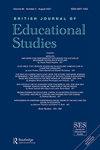在块模式课程中向紧急远程教学过渡:对澳大利亚一所大学学术经验的个案研究
IF 2.1
3区 教育学
Q2 EDUCATION & EDUCATIONAL RESEARCH
引用次数: 0
摘要
这个澳大利亚大学的案例研究探讨了在COVID-19大流行期间,在密集的块模型课程中向紧急远程教学(ERT)的过渡。一项在线调查调查了学者们对帮助或阻碍他们转型的因素的经历。对数据的专题分析揭示了块模式课程、专业学习和学者在转型过程中的代理感之间的共生关系。我们将我们的发现与Whittle等人的2020框架联系起来,并提出了一个基于教学如何受到变化的环境影响的扩展框架。根据扩展的框架,我们根据学术界如何反思性地适应ERT提出了未来的经验教训。在为期四周的模块模型中,吸取了经验教训并将其应用于后续模块。与高等教育机构相关的关键课程包括增加有效的、无监考的评估类型的多样性,以及通过促进学生与同龄人和学者联系的学习空间来促进学生的福祉。此外,学者们需要与同行建立联系,需要安全的空间来汇报不断变化的情况,并建立使用新学习技术的信心。专业学习促进了一个了解紧急情况的安全学习环境,有效地减少了孤立,使各机构更好地为未来的紧急情况做好准备。关键词:块模型;应急远程教学;高等教育院校;作者感谢审稿人的真知灼见,为这篇更有针对性的论文做出了贡献。披露声明作者未报告潜在的利益冲突。注1一个科目(单元/模块/论文/课程)包括所有的教学和评估,在传统的学期中,这些教学和评估包括13周的教学期和3周的考试期。在分组模式中,教学和评估在4周内完成。学生们一次学习一门学科。本文章由计算机程序翻译,如有差异,请以英文原文为准。
TRANSITIONING TO EMERGENCY REMOTE TEACHING IN A BLOCK MODEL CURRICULUM: A CASE STUDY OF ACADEMICS’ EXPERIENCES IN AN AUSTRALIAN UNIVERSITY
ABSTRACTThis Australian university case study explores the transition to emergency, remote teaching (ERT) in an intensive Block Model curriculum during the COVID-19 pandemic. An online survey investigated academics’ experiences of factors that helped or hindered their transition. A thematic analysis of the data revealed a symbiotic relationship between the Block Model curriculum, professional learning, and academics’ sense of agency as they experienced their transition. We relate our findings to Whittle et al.’s 2020 framework and propose an extended framework based on how teaching was influenced by the changed environment. Drawing on the extended framework, we propose lessons for the future based on how academics were reflectively adapting to ERT. In the four-week Block Model, lessons were learned and applied in the subsequent Block. Critical lessons relevant to higher education institutions include increasing diversity of effective, un-invigilated assessment types, and fostering student wellbeing by facilitating learning spaces where students connect with peers and academics. Furthermore, academics need connections with peers and safe spaces in which to debrief on evolving situations and build confidence in using new learning technologies. Professional learning fostering an emergency-informed, safe learning environment effectively reduces isolation and better prepares institutions for future emergencies.Keywords: Block Modelemergency remote teachinghigher educationuniversitiesacademics 7. AcknowledgmentsThe authors thank the reviewers for their insights contributing to a more focused paper.8. Disclosure StatementNo potential conflict of interest was reported by the author(s).Notes1 A subject (Unit/Module/Paper/Course) comprises all teaching and assessments, which in traditional semesters occurs over a 13-week teaching-period and a 3-week examination-period. In Block Model, teaching and assessments are complete within 4-weeks. Students study one subject at a time.
求助全文
通过发布文献求助,成功后即可免费获取论文全文。
去求助
来源期刊

British Journal of Educational Studies
EDUCATION & EDUCATIONAL RESEARCH-
CiteScore
4.50
自引率
5.30%
发文量
36
期刊介绍:
The British Journal of Educational Studies is one of the UK foremost international education journals. It publishes scholarly, research-based articles on education which draw particularly upon historical, philosophical and sociological analysis and sources.
 求助内容:
求助内容: 应助结果提醒方式:
应助结果提醒方式:


